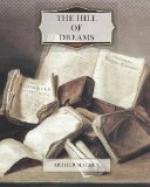as they were, annoyed and distracted him. He was
no longer infuriated or wounded by sneers of contempt
or by the cackling laughter of the young people when
they passed him on the road (his hat was a shocking
one and his untidiness terrible), but such incidents
were unpleasant just as the smell of a drain was unpleasant,
and threw the strange mechanism of his thoughts out
of fear for the time. Then he had been disgusted
by the affair of the boys and the little dog; the
loathsomeness of it had quite broken up his fancies.
He had read books of modern occultism, and remembered
some of the experiments described. The adept,
it was alleged, could transfer the sense of consciousness
from his brain to the foot or hand, he could annihilate
the world around him and pass into another sphere.
Lucian wondered whether he could not perform some
such operation for his own benefit. Human beings
were constantly annoying him and getting in his way,
was it not possible to annihilate the race, or at
all events to reduce them to wholly insignificant forms?
A certain process suggested itself to his mind, a work
partly mental and partly physical, and after two or
three experiments he found to his astonishment and
delight that it was successful. Here, he thought,
he had discovered one of the secrets of true magic;
this was the key to the symbolic transmutations of
the Eastern tales. The adept could, in truth,
change those who were obnoxious to him into harmless
and unimportant shapes, not as in the letter of the
old stories, by transforming the enemy, but by transforming
himself. The magician puts men below him by going
up higher, as one looks down on a mountain city from
a loftier crag. The stones on the road and such
petty obstacles do not trouble the wise man on the
great journey, and so Lucian, when obliged to stop
and converse with his fellow-creatures, to listen
to their poor pretences and inanities, was no more
inconvenienced than when he had to climb an awkward
stile in the course of a walk. As for the more
unpleasant manifestations of humanity; after all they
no longer concerned him. Men intent on the great
purpose did not suffer the current of their thoughts
to be broken by the buzzing of a fly caught in a spider’s
web, so why should he be perturbed by the misery of
a puppy in the hands of village boys? The fly,
no doubt, endured its tortures; lying helpless and
bound in those slimy bands, it cried out in its thin
voice when the claws of the horrible monster fastened
on it; but its dying agonies had never vexed the reverie
of a lover. Lucian saw no reason why the boys
should offend him more than the spider, or why he
should pity the dog more than he pitied the fly.
The talk of the men and women might be wearisome and
inept and often malignant; but he could not imagine
an alchemist at the moment of success, a general in
the hour of victory, or a financier with a gigantic
scheme of swindling well on the market being annoyed
by the buzz of insects. The spider is, no doubt,




